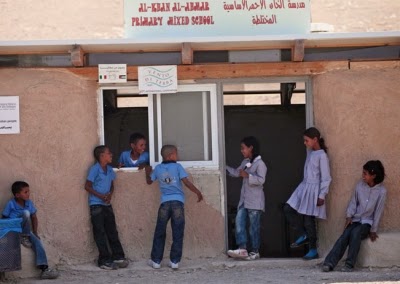Civil
Administration demolishes structures, confiscates water tanks in Palestinian
communities in northern Jordan Valley
This
morning, Civil Administration bulldozers returned to the Jordan Valley,
demolishing the homes of four families and farming structures in Khallet Makhul
and a farming structure in the village of al-Hadidiyah. The Administration also
confiscated two waters tanks in the 200-person village of al-Farisiyah, which
is not connected to a water supply network. A more detailed report will follow
B'Tselem's investigation of the incidents.
18 Mar 2015
Civil
Administration demolishes ‘Ein Karzaliyah for the second time this winter
Mar.
4, Israeli authorities demolished all structures in Khirbet ‘Ein Karzaliyah in
the northern Jordan Valley, for the second time this year. Bulldozers raked the
dirt road leading to the community, preventing access by car. This cruel
harassment of a particularly vulnerable population is part of Israel’s policy
aimed at displacing thousands of Palestinians from communities throughout Area
C. B'Tselem urges Israel to allow residents of Khirbet ‘Ein Karzaliyah to
remain where they have lived and grazed their flocks for 25 years without
interference.
Civil Administration dismantles, confiscates
water pipes in Khirbet Yarza, Jordan Valley
On 29 Jan. 2015, the Civil Administration
dismantled water pipes recently installed for the small shepherding community
of Khirbet Yarza in the Jordan Valley and confiscated the parts. Before the
installation, the community relied on rainwater and private water purchase.
This is one measure of several taken by Israeli authorities to relocate
thousands of Palestinians living in Area C. As the occupying power in the West
Bank, Israel must allow residents to maintain their lifestyle, permit them to
build legally, and provide them water and electricity.
Civil
Administration serves eviction orders to al-Ka’abneh community near Wadi Qelt,
West Bank
On
12 Jan. 2015, the Civil Administration ordered all 15 families in the
al-Ka’abneh community to leave in 48 hours due to “recent incursion into state
land”. Att. Shlomo Lecker filed an objection on behalf of the families, who
have lived near Wadi Qelt since 1983, after twice being evicted from future
settlement sites. The Administration must enable Bedouin communities to
maintain their lifestyle, plan independently and build legally, as well as
connect them to infrastructure and provide them with basic health and education
services.
Civil
Administration again demolishes all homes in Khirbet 'Ein Karzaliyah
This
morning, Civil Administration bulldozers again demolished all the community’s
structures, including the five tents in which the families were living. This is
the fourth time that these families have been left homeless since January 2014.
Previous demolitions took place in January, February and April 2014 (when only
some of the residential tents were destroyed).
Kh.
Um al-Jamal: Israeli military demolishes 5 families’ tents mere days before the
storm
On
1 January 2015, with clear forecasts of an impending storm, the Israeli
military and Civil Administration demolished the tents and some of the property
of five families in Khirbet Um al-Jamal, a shepherding community in the Jordan
Valley. Thirty individuals, including 22 minors, were left exposed to the
elements, yet authorities did not arrange for alternate housing. The Red
Crescent and the PA provided replacement tents, but these do not offer adequate
shelter from the rain. In the course of the storm, Israeli human rights NGO
MachsomWatch took it upon itself to supply plastic sheeting to the residents to
weatherproof the tents. In February 2014 we reported the demolition of all
structures in this community by Israeli authorities.
Civil
Administration demolishes nearly half the homes in community of Id’eis, the
Jordan Valley
On
21 May 2014, Civil Administration and army forces demolished approximately half
of the homes and livestock pens in the community of Id’eis in the Jordan
Valley, leaving 53 persons homeless. This joins other extensive efforts by
Israeli authorities to expel thousands of Palestinians from their homes
throughout Area C, despite the prohibition on forced transfer in international
law. B’Tselem calls on authorities to allow the Id’eis community continue its
agricultural lifestyle undisturbed, as it has done for the last thirty years.
Despite
HCJ ruling, military trains in Kh. Jenbah fields, South Hebron Hills
Kh.
Jenbah is in Firing Zone 918 whose residents Israel wants to expel. After
prolonged court proceedings, the villagers’ fate is currently being decided in
mediation. Pending its outcome, an interim injunction prohibits expulsion of
the villagers or harm to their property. In violation of the court order, the
military last week trained in Jenbah’s fields, thereby damaging the crops. ACRI
conveyed to the military GPS readings by B’Tselem as evidence of the training
and it was discontinued. Photos by B’Tselem field researcher Nasser Nawaj'ah.
High
Court rejects settlements’ petition to demolish Khan al-Ahmar school
On
13 May 2014 the HCJ rejected a petition by settlements in the Ma’ale Adumim
area to implement demolition orders for a school and homes in Khan al-Ahmar, a
Bedouin community. The rejection was grounded in the State’s announced plan to
relocate the community to a site north of Jericho and its declared intention of
preventing harm to minors. The relocation plan has yet to be shown to the
residents, who object to the idea and demand a planning solution at their
current location. International law prohibits forced transfer of protected
civilians.
35
residents of Wadi al-Qatif, west of Jericho, face imminent expulsion
The
Bedouins of Wadi al-Qatif, currently 68 persons, have lived in that location
since 1982. In April 2014, following an application to the HCJ against
demolition orders served for all homes there, the state advised of its plans to
relocate the community to permanent sites. Yet 4 days later some residents were
served 48-hour eviction orders. The HCJ then issued an interim injunction on
the eviction. International law prohibits forced relocation. B’Tselem calls on
the authorities to allow the community to remain in Wadi al-Qatif.










No comments:
Post a Comment